Serving 15 students in grades 5-12, Outlook Academy Youth Home Campus ranks in the top 50% of all schools in Michigan for overall test scores (math proficiency is top 30%, and reading proficiency is top 50%).
The percentage of students achieving proficiency in math is <50% (which is higher than the Michigan state average of 40%). The percentage of students achieving proficiency in reading/language arts is <50% (which is higher than the Michigan state average of 49%).
The student:teacher ratio of 8:1 is lower than the Michigan state level of 17:1.
Minority enrollment is 20% of the student body (majority Hispanic), which is lower than the Michigan state average of 37% (majority Black).
Quick Stats (2025)
- School Type: Charter School
- Grades: 5-12
- Enrollment: 15 students
- Student:Teacher Ratio: 8:1
- Minority Enrollment: 20%
- Graduation Rate: <50%
- Math Proficiency: <50% (Top 1% in MI)
- Reading Proficiency: <50% (Top 1%)
- Science Proficiency: <50% (Top 30%)
- Source: National Center for Education Statistics (NCES), MI Dept. of Education
Top Rankings
Outlook Academy Youth Home Campus ranks among the top 20% of public schools in Michigan for:
Category
Attribute
Percent Eligible For Free Lunch
Community Size
Student Attention
School Overview
Outlook Academy Youth Home Campus's student population of 15 students has grown by 25% over five school years.
The teacher population of 2 teachers has stayed relatively flat over five school years.
School Type
Grades Offered
Grades 5-12
Total Students
15 students
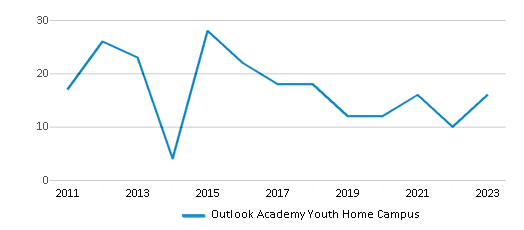
Gender %
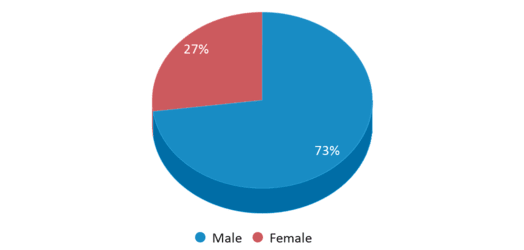
Total Classroom Teachers
2 teachers
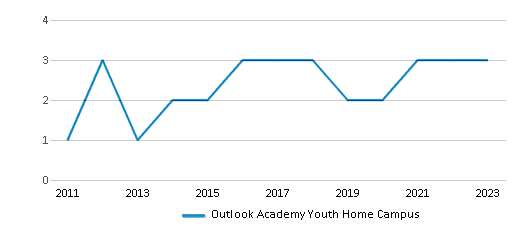
Students by Grade
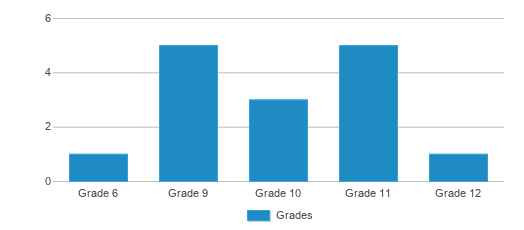
School Rankings
The diversity score of Outlook Academy Youth Home Campus is 0.34, which is less than the diversity score at state average of 0.56. The school's diversity has stayed relatively flat over five school years.
Math Test Scores (% Proficient)
(18-19)<50%
40%
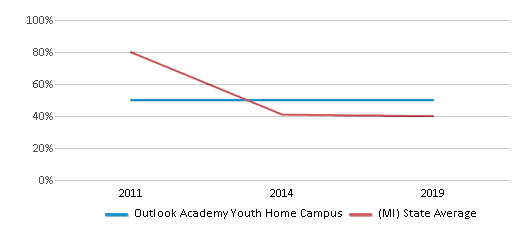
Reading/Language Arts Test Scores (% Proficient)
(18-19)<50%
49%
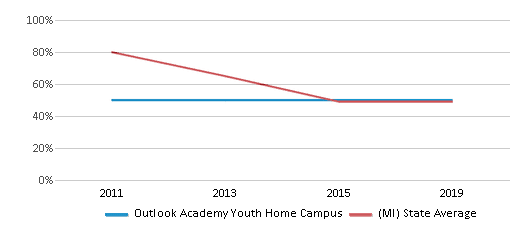
Science Test Scores (% Proficient)
<50%
38%
Student : Teacher Ratio
8:1
17:1
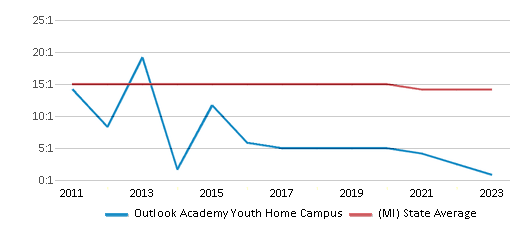
American Indian
n/a
1%
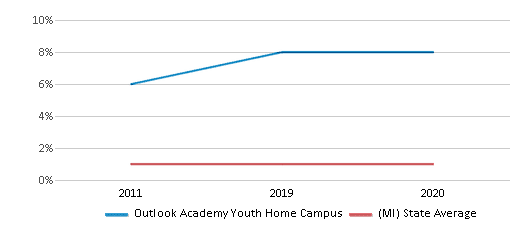
Asian
n/a
4%
Hispanic
13%
9%
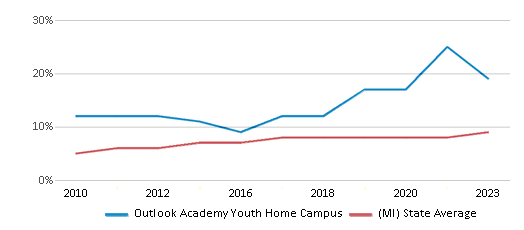
Black
7%
18%
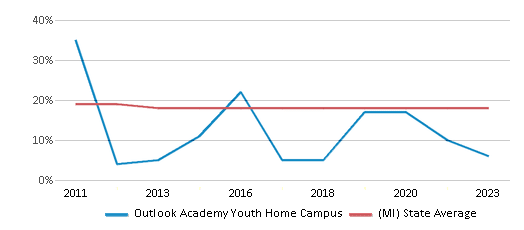
White
80%
63%
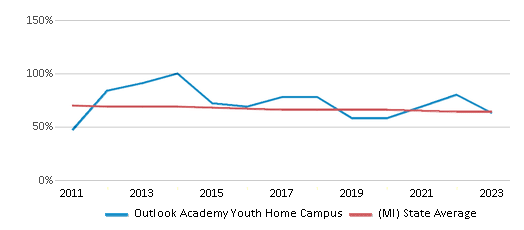
Hawaiian
n/a
n/a
Two or more races
n/a
5%
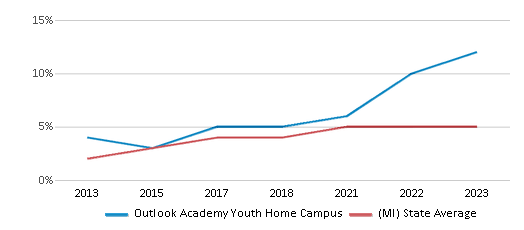
All Ethnic Groups
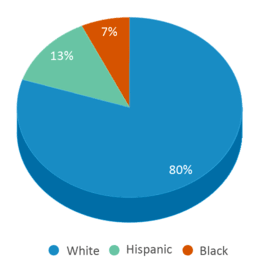
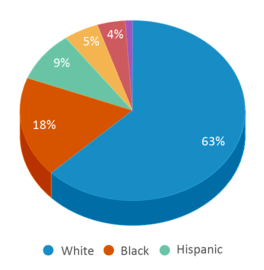
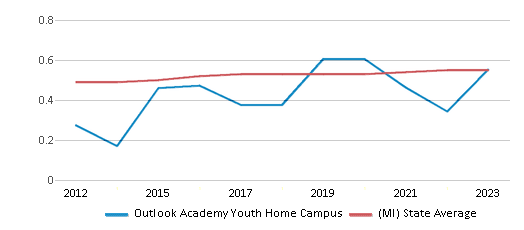
Graduation Rate
(19-20)<50%
86%
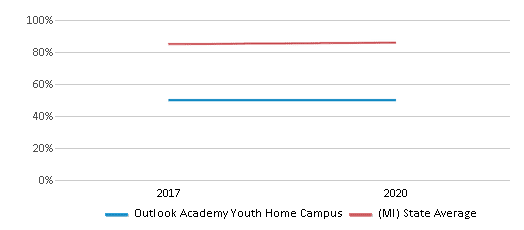
Participates in the National School Lunch Program (NSLP)
Yes
Eligible for Free Lunch
80%
50%
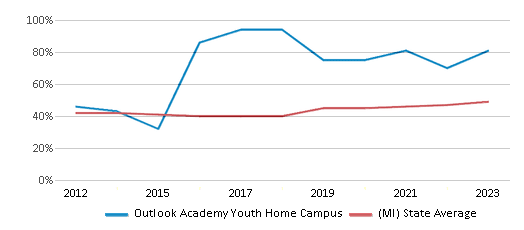
Eligible for Reduced Lunch (11-12)
4%
5%
School Statewide Testing
School District Name
Source: National Center for Education Statistics (NCES), MI Dept. of Education
Frequently Asked Questions
What percent of students have achieved state testing proficiency in math and reading?
<50% of students have achieved math proficiency (compared to the 40% MI state average), while <50% of students have achieved reading proficiency (compared to the 49% MI state average).
What is the graduation rate of Outlook Academy Youth Home Campus?
The graduation rate of Outlook Academy Youth Home Campus is 50%, which is lower than the Michigan state average of 86%.
How many students attend Outlook Academy Youth Home Campus?
15 students attend Outlook Academy Youth Home Campus.
What is the racial composition of the student body?
80% of Outlook Academy Youth Home Campus students are White, 13% of students are Hispanic, and 7% of students are Black.
What is the student:teacher ratio of Outlook Academy Youth Home Campus?
Outlook Academy Youth Home Campus has a student ration of 8:1, which is lower than the Michigan state average of 17:1.
What grades does Outlook Academy Youth Home Campus offer ?
Outlook Academy Youth Home Campus offers enrollment in grades 5-12
What school district is Outlook Academy Youth Home Campus part of?
Outlook Academy Youth Home Campus is part of Outlook Academy School District.
School Reviews
5 12/27/2014
First thing anyone considering sending their student to Outlook should understand is that Outlook is for students that are expelled from their home school or on long term suspensions. That mean that Outlook is not for every student and our students come to us with a unique and varied set of challenges. These include drug addiction, poverty, neglect, anger issues, and almost all of our student come to Outlook preforming well under grade level.
Staff uses a level system, small class size, technology, relationship building, rewards, and limited one on one interventions to try to over come these challenges. However, no school can make a student learn or behave, the student must make that choice. These choices become harder for the student to make when there is little support or outright sabotage from parents. Of course staff tries hard and never gives up on a student, we continually try to educate students on the reasons why positive choices and education matter. However, if a continually chooses to sleep or act up and parents refuse to come pick up their child, what exactly should staff do for that student?
Outlook is a program that works very well for students that are ready to make positive changes. Is it a good fit for every student? No, but Outlook has had a lot of success with a lot of its students. However, parents and students that are excuse makers should either be ready to accept the consequences of their actions or find a different program.
Review Outlook Academy Youth Home Campus. Reviews should be a few sentences in length. Please include any comments on:
- Quality of academic programs, teachers, and facilities
- Availability of music, art, sports and other extracurricular activities
Recent Articles

What Is A Charter School?
Explore the world of charter schools in this comprehensive guide. Learn about their history, how they operate, and the pros and cons of this educational innovation. Discover key facts about charter schools, including admission policies, demographics, and funding, as well as what to look for when considering a charter school for your child.

10 Reasons Why High School Sports Benefit Students
Discover the 10 compelling reasons why high school sports are beneficial for students. This comprehensive article explores how athletics enhance academic performance, foster personal growth, and develop crucial life skills. From improved fitness and time management to leadership development and community representation, learn why participating in high school sports can be a game-changer for students' overall success and well-being.

February 05, 2025
Understanding the U.S. Department of Education: Structure, Impact, and EvolutionWe explore how the Department of Education shapes American education, from its cabinet-level leadership to its impact on millions of students, written for general audiences seeking clarity on this vital institution.





